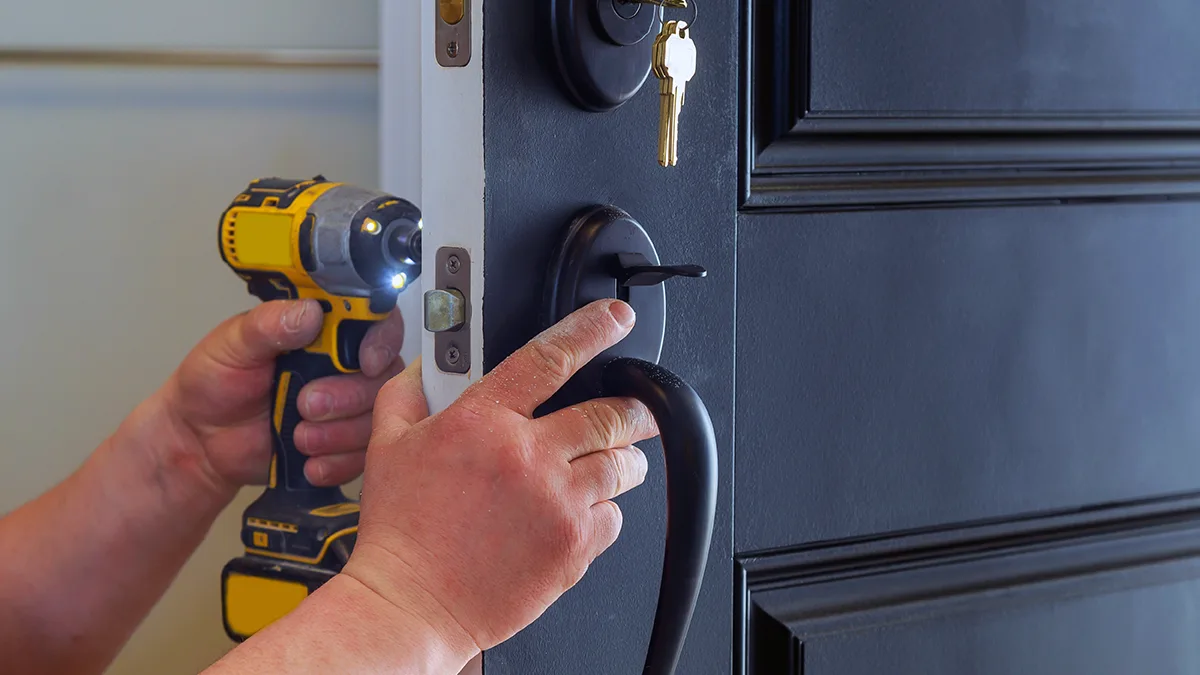Everything You Need to Know About uPVC Door Lock Repairs. In today's fast-paced world, ensuring the…
Locksmith Ethics: Building Trust Through Responsible Practices
Locksmith ethics: Building trust through responsible practices. In a world where security is paramount, locksmith ethics play a crucial role in building trust and ensuring the safety of clients.
Responsible locksmithing is not just about technical skills; it encompasses a commitment to integrity, transparency, and professionalism.
Locksmith Ethics
For locksmiths, this means securing proper licensing and certifications, which not only affirm their expertise but also reassure clients of their credibility.
Protecting customer privacy in locksmithing is another cornerstone of ethical practice, requiring locksmiths to handle sensitive information with utmost discretion.
Additionally, ethical lock installations and repairs are essential, ensuring that clients receive honest and effective solutions.
Moreover, transparency in locksmithing pricing helps foster trust by eliminating unexpected costs, while ongoing training for locksmiths keeps them abreast of the latest security technologies and locksmith best practices.
By adhering to these principles, locksmiths can position themselves as trusted advisors and reliable service providers, earning the confidence and assurance of their community.
Essential Locksmith Ethics
Responsible Locksmithing Practices
Responsible locksmithing involves more than just skillful lock handling.
At its core, it requires a commitment to ethical standards that uphold the integrity of the profession.
Securing proper locksmith licensing is fundamental, serving as a testament to a locksmith’s qualifications and adherence to legal requirements.
These credentials not only validate a locksmith’s competence but also provide clients with peace of mind.
Furthermore, locksmiths must respect customer privacy by ensuring any sensitive information, such as security codes and personal details, is handled confidentially.
Ethical lock installations and repairs are crucial, meaning that locksmiths should always recommend solutions that genuinely meet the client’s needs rather than pushing unnecessary services.
Transparent communication about pricing and services is another critical aspect, preventing misunderstandings and fostering trust.
By consistently practising these responsible actions, locksmiths can build a reputation as reliable and trustworthy professionals within their community.
Importance of Locksmith Licensing
Locksmith licensing is a cornerstone of ethical practice in the industry. It ensures that locksmiths possess the necessary skills and knowledge to perform their duties safely and effectively.
Licensing serves as a regulatory measure, safeguarding clients from unqualified individuals who might compromise security.
For locksmiths, holding valid licenses is a mark of professionalism and credibility.
It reassures clients that the services provided meet stringent standards and comply with local regulations.
Furthermore, licensing often requires locksmiths to undergo continuous education, keeping them updated with the latest security advancements and locksmith best practices.
This commitment to ongoing learning enhances their ability to offer cutting-edge solutions.
For customers, choosing a licensed locksmith is a step towards ensuring their property is in safe hands.
It builds trust, as clients can be confident that the locksmith adheres to a code of ethics, prioritising their security and privacy at all times.
Customer Privacy in Locksmithing
Customer privacy is an essential component of locksmith ethics, reflecting a commitment to safeguarding sensitive information.
Locksmiths often gain access to clients’ homes, offices, and security details, which mandates a high level of discretion and trustworthiness.
Handling such information responsibly is crucial, as any breach could lead to significant security risks.
Ethical locksmiths ensure that all confidential data, from key codes to personal details, is protected and not disclosed to unauthorised individuals.
This practice not only protects clients but also enhances the locksmith’s reputation for integrity and reliability.
Moreover, locksmiths must adopt secure methods of storing and managing customer information, utilising technology that prevents unauthorised access.
By prioritising customer privacy, locksmiths reinforce the trust clients place in them, ensuring long-term relationships.
Ultimately, respecting privacy is not just about legal compliance; it is about building a foundation of trust and confidence within the community they serve.
Ethical Techniques and Transparency
Ethical Lock Installations
Ethical lock installations are fundamental to upholding the trust clients place in locksmiths.
This involves recommending and installing locks that truly meet the security needs of the client rather than upselling unnecessary or costly solutions.
An ethical locksmith evaluates the specific requirements of a property, considering factors such as location, security risks, and client preferences, to suggest suitable locking mechanisms.
This personalised approach ensures that clients receive value for their investment and heightened security.
Additionally, ethical locksmiths adhere to best practices during installation, ensuring that locks function smoothly and without potential risk of malfunction.
Transparency regarding the capabilities and limitations of each lock type is also important, allowing clients to make informed decisions.
By prioritising ethical installations, locksmiths demonstrate their commitment to serving the client’s best interests, fostering a relationship built on trust and professionalism.
This ethical approach not only boosts client confidence but also strengthens the locksmith’s reputation in the community.
Transparency in Locksmithing Pricing
Transparency in locksmithing pricing is crucial for building trust and ensuring customer satisfaction.
Clients expect clear and upfront communication about costs, which prevents surprises and fosters a sense of reliability.
Ethical locksmiths provide detailed quotes that outline all potential charges, including service fees, equipment costs, and any additional expenses that might arise during the work.
This practice empowers clients to make informed decisions by understanding exactly what they are paying for.
Moreover, transparent pricing helps distinguish reputable locksmiths from those who might exploit situations with hidden charges.
A straightforward pricing approach also reflects professionalism and respect for customers, reinforcing the locksmith’s credibility.
In instances where unforeseen issues lead to price adjustments, honest communication is vital to maintain trust.
By committing to transparency in pricing, locksmiths not only enhance client relationships but also establish themselves as trustworthy service providers who prioritise fairness and integrity in their business operations.
Clear Communication with Clients
Clear communication is an integral part of ethical locksmithing, playing a pivotal role in managing client expectations and ensuring satisfaction.
From the initial enquiry through to the completion of the job, locksmiths should engage in open and honest dialogue with clients.
This includes discussing the scope of work, explaining technical aspects in layman’s terms, and providing realistic timelines for service delivery.
Effective communication involves listening actively to the client’s concerns and requirements, which allows locksmiths to tailor their services appropriately.
Furthermore, when challenges arise, such as unexpected complications during a job, timely and candid updates are essential to maintaining trust.
This transparent exchange not only aids in avoiding misunderstandings but also reinforces the client’s confidence in the locksmith’s capabilities.
By prioritising clear communication, locksmiths demonstrate their commitment to customer service and ethical practice, ultimately strengthening their reputation as dependable and trustworthy professionals within their community.
Commitment to Professional Growth
Ongoing Training for Locksmiths
Ongoing training for locksmiths is essential for staying abreast of the latest security technologies and enhancing their skill set.
The security landscape is constantly evolving, with new lock systems and security challenges emerging regularly.
To provide the best possible service, locksmiths must commit to continuous education and professional development.
This involves participating in workshops, attending industry conferences, and enrolling in specialised courses that cover the latest advancements in security technology.
Such training ensures that locksmiths are well-equipped to handle a diverse array of security issues, from traditional lock mechanisms to advanced electronic systems.
Furthermore, ongoing training fosters innovation and adaptability, allowing locksmiths to offer cutting-edge solutions that meet the evolving needs of clients.
By investing in their professional growth, locksmiths not only improve their service quality but also reinforce their reputation as experts in the field.
This commitment to learning ultimately benefits clients, who can rely on knowledgeable professionals to safeguard their properties effectively.
Staying Updated with Security Technologies
Staying updated with security technologies is imperative for locksmiths aiming to provide the most effective and secure solutions to their clients.
As technology advances, so do the methods for securing properties, with innovations like smart locks, biometric systems, and integrated security networks becoming more prevalent.
Locksmiths must keep pace with these developments to offer relevant and modern solutions that meet current security demands.
This means engaging with the latest industry research, participating in training sessions, and experimenting with new tools and techniques.
By doing so, locksmiths can better advise clients on the most appropriate security measures for their needs.
Additionally, understanding new technologies enables locksmiths to address and mitigate vulnerabilities associated with outdated systems.
Keeping updated not only enhances a locksmith’s expertise but also builds client trust, as customers are assured that they are receiving advice and service based on the latest technological advancements in security.




Comments (0)